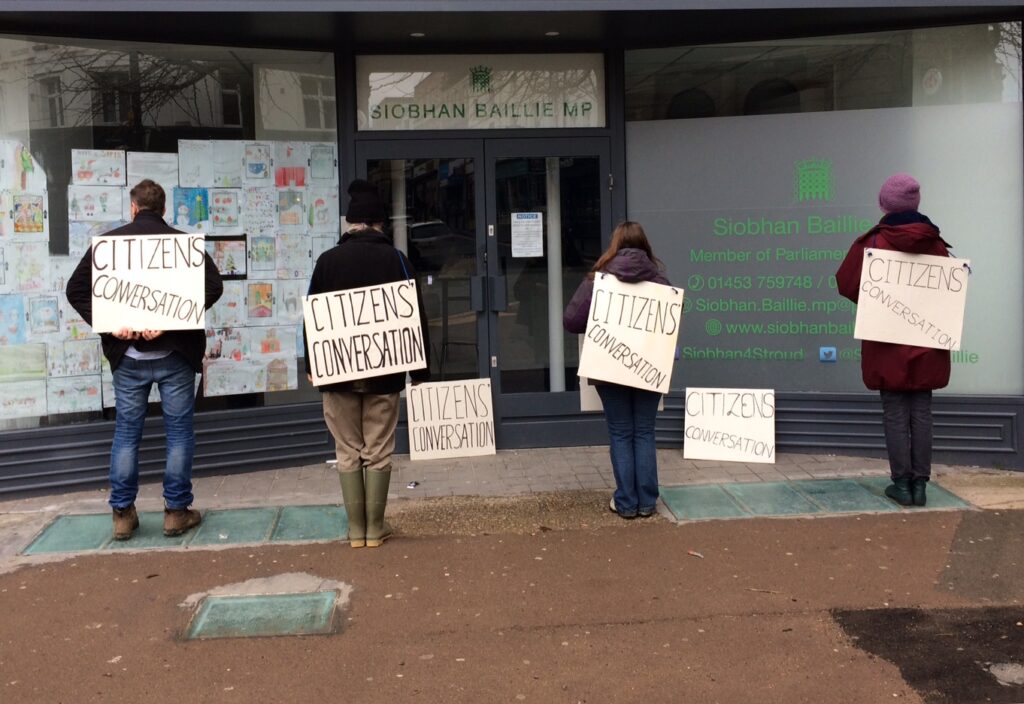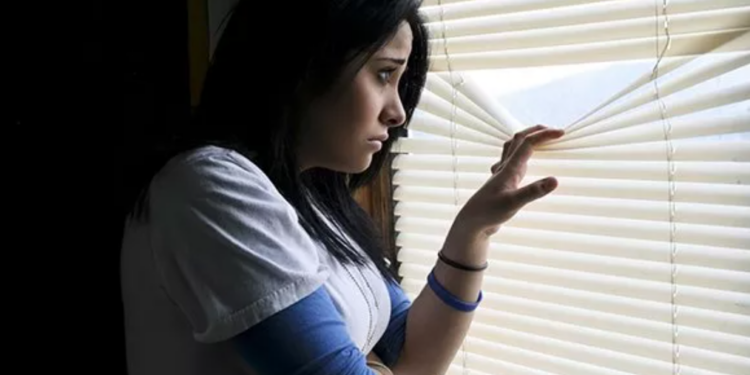Charges against two lockdown protestors have been dropped because pursuing them is “not in the public interest” – but the protestors may insist on going to court anyway so that the whole Covid lockdown debacle can be properly reviewed in a court of law.
The Crown Prosecution Service (CPS) has decided to discontinue its prosecution of two prominent Stroud activists, Marcus Blackett and Richard House, for allegedly breaking the Tier 4 lockdown regulations that were in force on January 9th 2021. The charge was that of “Participating in a gathering of more than two people in a public outdoor place in a Tier 4 area”. According to the CPS’s ‘Notice of Discontinuance’ dated February 14th 2023, this decision has been taken because “a prosecution is not needed in the public interest”. Marcus and Richard have the option of the case not being dropped, and are considering whether to go to court anyway so the important civil liberties issues surrounding their case fully aired in the public sphere.
In late 2020, the Stroud freedom group decided that something needed to be done locally for the sake of residents’ mental health, given the extreme coronavirus regulations. The U.K. Office for National Statistics was reporting a near doubling of rates of depression since the pandemic began.
In response to this crisis, half a dozen members of the group decided to start walking around Stroud wearing ‘Citizens’ Conversation’ sandwich-boards, inviting members of the public passing by to have a chat with them. Such excursions were made on a regular basis around Stroud town centre starting in November 2020. Marcus and Richard wished to offer their expertise to the people of their town – those who wished to engage with them – who were struggling mentally under the weight of the soul-crushing restrictions. They also wanted to protest against the imposition of the Covid regulations and to highlight that the ‘cure’ was worse than the disease.
On Saturday January 9th 2021, three group members were walking around Stroud town wearing ‘Citizens’ Conversation’ boards. Marcus and Richard were arrested near the High Street by an aggressive police officer “for breaking Coronavirus regulations” by holding an alleged “gathering”. When they were arrested, Richard was talking with a healthcare worker who was clearly upset at what was happening under lockdown and desperately needed someone to talk to.
Marcus and Richard were taken into custody and told they would receive a Fixed Penalty Notice and later a Summary Justice Procedure Notice. They decided to take a stand and challenged the notices. Following months of correspondence with the Chief Constable of Gloucestershire, they discovered, having not been notified of any trial date, that they had been convicted of the offence in absentia and saddled with criminal records and considerable fines.
Marcus and Richard then engaged the London solicitors Murray Hughman, who in October 2022 successfully applied for a re-trial, persuading the court to set aside the original convictions and fines and to reopen the case with a fresh trial ordered. In so doing, the court commented that the important and novel issues raised with regards to the interference with human rights might well be worthy of examination by the U.K. Supreme Court. Before the new trial took place, however, the CPS decided to drop the case, as described above.
The core concern with this case was the attack on civil liberties and common-law rights that this arrest exemplified, and Marcus and Richard hoped the court would draw a clear line in the sand so that in future the police would not be able to overreach their powers and encroach any further into what are increasingly fragile civil liberties.

Andrew Rootsey, criminal defence lawyer at Murray Hughman, said:
The frequently shifting sands of the Coronavirus regulations created substantial confusion, and saddled many well-intentioned citizens with criminal records and punitive fines. The legislation was rushed through Parliament, poorly drafted and ill-thought out. The regulations that were in place in January 2021 were completely inaccessible and opaque, and many, including the police and the courts, failed to understand or fully grasp them, leaving well-meaning people vulnerable to arbitrary and discriminatory decisions being made against them.
These convictions were appalling, unsettling and in my opinion plainly wrong. The response to criminalise two men with very real and reasonable concerns about the mental health implications upon the local community because of the draconian legislation passed is completely disproportionate. Moreover, contrary to public and often law enforcement understanding, the Coronavirus regulations never completely prohibited protesting, even during periods of national lockdown. The interference with Marcus and Richards’ fundamental human rights of freedom of expression and freedom of assembly cannot be said to be a proportionate response, given that both were engaging in legitimate protest.
Marcus Blackett said:
The Covid tier 1,2,3,4 regulations were opaque and confusing, and what still remains unclear is whether the right to protest was banned, because this is an unalienable right, and suspending it is illegal, unless expressly ordered by the Chief Constable. When the CCTV spotted our High Street protest, every other on-duty officer ignored it, all except for Sgt Garrett Gloyn who was in a village eight miles away at the time. I will be looking at laying charges if, indeed, it is the case that protests were not banned.
Richard House, a chartered psychologist, said:
Of course this is tremendous news for both ourselves and, more importantly, for the freedom movement more generally. Our only regret is that we won’t now have our day in court and the opportunity to have a full public airing of all the shenanigans surrounding Covid and its legion vicissitudes. Indeed, we suspect that this might well be the real reason for the CPS dropping the case – i.e., it was determined to obviate the embarrassment of the whole Covid psychodrama being publicly deconstructed in a court of law. There’s no doubt that our brilliant legal team would have driven a coach and horses through all of it – and the CPS knew it. We would like to thank both our solicitors, the London criminal law firm Murray Hughman, and also the many friends and supporters who generously supported our legal fund. Thanks also to the great freedom-loving publishing editors who supported our case – Toby Young, Simon Best, Tom Raines and Darren Smith. Thank you, one and all, for enabling this great blow for freedom and human rights to be struck.














To join in with the discussion please make a donation to The Daily Sceptic.
Profanity and abuse will be removed and may lead to a permanent ban.
Hypocrisy still a thriving industry in The People’s Republic of Krankie.
Coming soon south of the border…..
Living in Sturgeon’s one party state is shit, (even though only about 30% of the electorate vote for her).
We wish we could win the lottery and move to a more normal part of the UK
Though not as bad as Krankieland, don’t expect too much from the rest of the UK.
Don’t care. We want out of this.
So her freedom of speech could lead to a ballot where freedom of choice is extinguished. I agree with freedom of speech but I do not agree with her aim. Religious beliefs should not be forced on others.
All laws are meant to reduce somebody’s freedom to do something, hence, this doesn’t make a good argument (a property it shares with bleating — a neutral verb would be more appropriate here — about costs or public health). The lady can only be a menace to society if she’s actually a witch, ie, a person capable of speaking words of power (etc) which cause undesirable effects on their own. This is a ludicrous proposition.
Further, what she proposes would need to be a menace to society and whether or not or under which specific conditions unwanted pregancies may be legally terminated certainly doesn’t qualify for that. People getting children is not a menace to society, rather the opposite. Pregnancies also don’t occur accidentally: Without casual sex, an option available to everyone, there won’t be unwanted pregnancies (corner cases intentionally ignored).
Lastly, when she’s free to make her argument, this offers an opportunity to refute it. People who believe their different opinion on the matter would be correct should certainly be able to do that without resorting to bleating about abstract concepts like choice, extremism or personal autonomy. Especially if the same people are all for their personal autonomy but not so much about the personal autonomy of others. SNP members can be regarded as principally in favour of forced injections of experimental medical products without clear benefits (if any).
While I decidedly disagree with the notion that people’s consensual sexual habits should be regulated by the state using the pretext that they’d be public health issues — especially after two years of flagrant abuse of them same pretext by members of the other political faction — (apparently an ADF position) arguments ought to be addressed with arguments and not with guilty-by-association based prohibitions.
The Scottish parliament doesn’t exist by the grace of God and hence, its members have no authority over other people’s consciences or sins.
“Why is the Scottish Government Trying to Silence Me?”
Because they’re a National Socialist Party, and that’s what they do.
They’re never happy unless they’re oppressing someone.